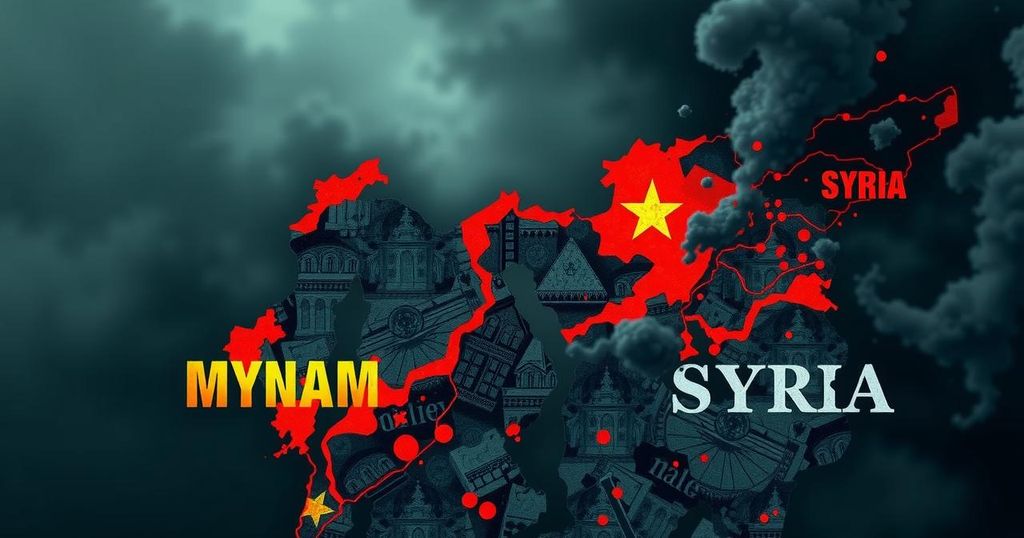The article illustrates Myanmar’s descent into civil war post-coup, drawing comparisons with Syria’s conflict. The military junta’s oppression and actions from ethnic armed groups complicate the moral dynamics of the war. The Rohingya continue to face existential threats amidst ongoing violence, with international powers responding ineffectively. A call for reconciliation between warring factions emphasizes the need for a united effort to address the humanitarian and governance crises impacting the nation.
Myanmar’s current situation resembles a devastated battlefield more than a hopeful democracy, drawing parallels to Syria under Bashar al-Assad’s regime. Nearly four years post-coup, the nation is engulfed in a civil war that has escalated dramatically, primarily characterized by the military’s severe oppression and counter-resistance actions by ethnic armed groups. The Tatmadaw, Myanmar’s ruling military backed by China and Russia, continues to perpetrate widespread violence, decimating local populations while anti-junta forces are also implicated in human rights violations, complicating the moral landscape of this conflict. In Rakhine State, the plight of the Rohingya people evidences a tragic continuity of state-sponsored violence as they suffer yet another wave of genocidal acts at the hands of both the military and local armed groups like the Arakan Army. These actions underscore the complex dynamics within the opposition, which does not uniformly advocate for an inclusive, democratic vision, as various factions pursue their local agendas. The international response, particularly from the United Nations, underscores the gravity of the situation, with Nicholas Koumjian noting that war crimes are occurring with little accountability. As regional powers like China and ASEAN exhibit ambivalence regarding effective resolutions, the struggles of Myanmar’s multitude ethnic groups to establish peace and stability grow increasingly dire. While some areas may achieve military successes against the junta, the absence of a coherent strategy for governance and reconciliation casts a shadow over prospects for lasting change. Moreover, the attendant humanitarian crisis is exacerbated by the junta’s strategy of mass conscription and the interruption of essential services, leading to public health challenges and escalating costs of living. The geopolitical shifts, notably China’s supportive stance towards the junta, significantly inhibit any meaningful efforts for democratic restoration. Historically, Myanmar’s pro-democracy movements have been marred by an inability to forge cross-ethnic alliances, limiting the potential for a unified front against the ruling military apparatus. As voiced by Julia Bishop, UN Special Envoy for Myanmar, the ongoing armed conflict has created an environment where progress remains stymied. Introspection is vital, with forward-thinking leaders acknowledging the necessity of reconciliation, lest Myanmar descend into an enduring fracture akin to contemporary Syria.
The article discusses the escalating civil conflict in Myanmar after the military coup in February 2021, contrasting the situation with the ongoing civil war in Syria. Under the military junta led by Min Aung Hlaing, Myanmar is witnessing severe human rights violations amidst fighting between the Tatmadaw and various ethnic armed groups. The Rohingya genocide continues to cast a shadow, complicating the political and humanitarian landscape, while international responses struggle to generate effective solutions.
In conclusion, the landscape of Myanmar today reflects a dire reality that threatens to solidify the nation’s fracturing along ethnic and ideological lines. Engaging in meaningful reconciliation across factions is imperative for any chance at establishing a united, stable Myanmar. The world must recognize the nuanced challenges facing all ethnic groups, particularly the Rohingya, to foster a constructive resolution and avoid the tragic fate of an indefinitely divided nation, reminiscent of Syria.
Original Source: asianews.network







